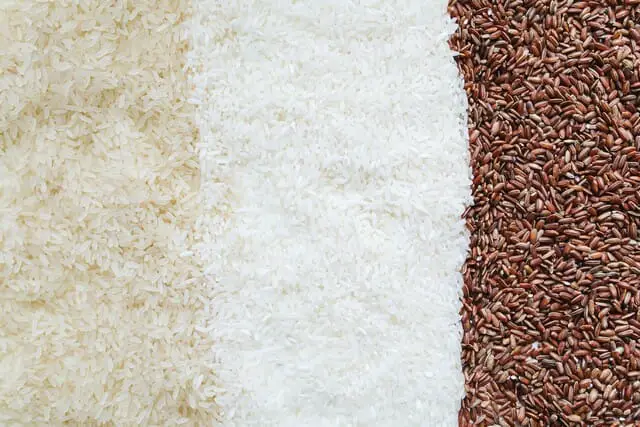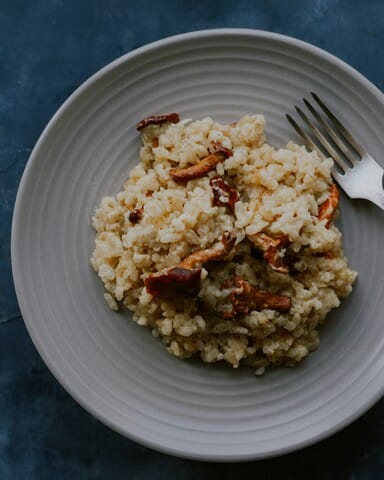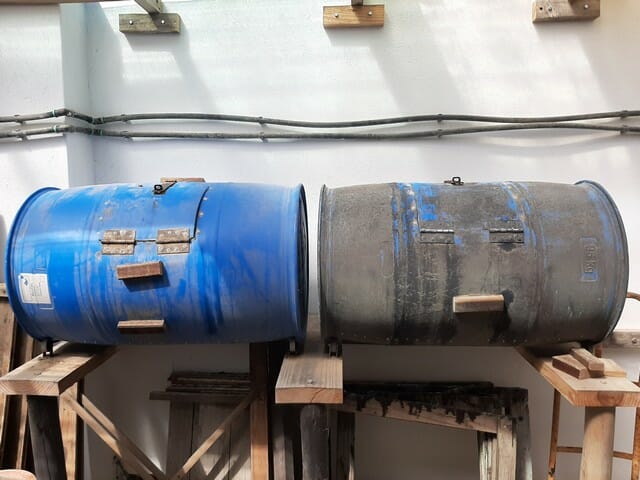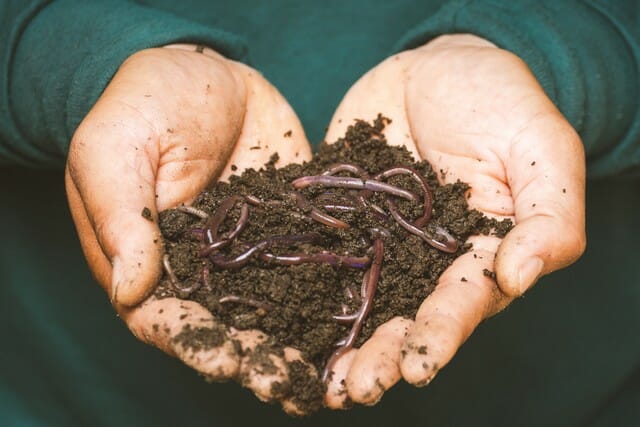Last Updated on April 19, 2022 by Grow with Bovees

If you’ve prepared plenty of rice for a dinner party and have loads leftover and don’t know what to do with it, you may be wondering, can you compost rice the same way you would compost other kitchen waste.
So, to answer to the question, is rice compostable, yes, rice is compostable and while rice is an organic matter and both cooked and uncooked rice — whether it be white or brown rice — will break down in the compost bin, it can still be tricky to accomplish the process of composting rice.
And, it is recommended to compost cooked rice as well as uncooked rice at home only if you are an experienced composter and compost frequently because composting uncooked rice can attract pests, while composting cooked rice can breed harmful bacteria. Worms love rice.
But if you still want to go ahead and compost rice, then in our article we will discuss how to succeed in this composting process without having many problems with your compost pile.
We will start off by discussing the difference between composting cooked or uncooked rice and what you should take into consideration when planning on composting rice.
Composting Cooked Rice — What to Consider

When stale leftover rice is added to compost piles, cooked rice will start to decompose.
As with other types of kitchen scraps food, cooked rice that has been steamed or boiled will rot quickly and go through the same rotting and molding stages as other foods that are added to a compost pile.
However, if the rice does not break down quickly enough, it will turn into a breeding ground for harmful unwanted bacteria and attract pests and other unwanted visitors.
And, if you are dealing with cooked or fried rice that contains oil, sauces, and other condiments or spices, then you will have the additional problem of unwelcome visitors like rodents, insects, etc. to your backyard compost heap.
While pests may not be such a deal-breaker, bad bacteria may be the key reason why most people prefer to avoid composting cooked rice.
Is Cooked Rice “Green” or “Brown” Material?
If you consider the nutritional value of plain rice, it is mainly a carb with some amount of protein. Some people consider white rice as green material; however, there is not sufficient nitrate to categorize rice as green.
Since rice is high in carbs with some nitrate content, it is better to consider it as a balanced food as far as composting is concerned.
This means that if you only have cooked rice, you can convert it to compost material without the need to add anything else to it. However, adding hydrated white lime to the compost pile can help to reduce the chance of any acidity occurring while the rice decomposes.
Can Uncooked Rice Be Composted?

Adding uncooked rice to the traditional compost bin will attract rodents and insects. However, you won’t have any problems adding rice into the compost if you have a hot compost pile, a closed compost bin or covered bin/enclosed bin. You can also make use of a rodent proof bin to avoid the compost rice to attract rodents.
If you are concerned about rodents when deciding to compost uncooked rice, then it is advisable to not add rice that is uncooked to the pile.
You can choose to add hydrated white lime to the compost bin, which can also help to prevent rodents.
Tiny amounts of raw rice in a compost heap may be fine; however, you must take care not to overdo it and add large quantities of rice clumps when composting rice, this could mean trouble.
Why Should You Compost Rice?
Rice is an organic material and if you already have a compost pile, then you may feel that it is a waste to put it into the trash instead of composting the leftover food scraps.
And, if you are a regular composter, then you may feel that you would like to compost as much organic waste as possible without throwing the stuff away, including cooked or uncooked rice.
Why You Shouldn’t Add Rice To Your Compost Pile
The grains of white rice are quite small and they can become quite sticky when wet, which can cause them to clump together when put into the compost pile. The composting rice can become anaerobic, which turns it into an unpleasant, smelly compost pile.
If you do manage to prevent the rice from clumping together, as we discussed earlier, you can still have issues, as it may attract unwanted visitors such as hazardous bacteria, pests, and insects.
So, if you’re an inexperienced composter, you may find that by adding cooked rice, or uncooked rice for that matter, to your compost pile, you may be doing more harm than good.
So, How to Compost Rice?
Now that we have answered the question of can you compost rice, it is time to learn how.
If you choose that you don’t want to waste the leftover rice and want to compost rice, then here are a few useful tips on how you can do it.
Hot Composting
Hot pile composting is essentially a composting method where the temperature of the compost pile can go up to 150°F to 160°F. At this temperature, the organic materials in the composting pile break down very fast and all the dangerous bacteria are killed.
It’s important to keep the compost aerated with plenty of oxygen. This is to encourage the healthy growth of soil microbes and to prevent your heap from becoming foul smelling.
So, it is recommended that you place the rice in the middle of the hot compost pile. This helps to kill any harmful bacteria and other pathogens.
Certain bones can also be composted in this type of composting system.Also, pests such as unwanted vermin avoid hot compost heaps and as the compost pile begins cooling down, all the food waste materials are decomposed.
However, hot composting needs proper maintenance and a few composting tools, and can be rather difficult if you’re an amateur composter.
Using a Pest-Proof Compost Bin
If you’re unable to use the hot process or don’t have a large yard to keep the compost pile away far from the house, then the best alternative is to purchase a rodent or pest-proof bin. These are essentially enclosed bins that help to keep the pests out of your compost and unpleasant odors in.
Use a Compost Tumbler

You can use a compost tumbler with two chambers which will allow you to have a continuous supply of finished compost. And, since the tumbler is raised above the ground, pests like rodents will find it difficult to reach it.
Many items can be composted in a compost tumbler, including coffee filters, bread, banana peels, cardboard, onion peels and citrus peels. They are a very worthwhile investment.
Using a compost tumbler will help the entire process of composting much better, and you will end up with a better product than even the best store-bought compost in a bag.
Agitating the heap regularly will ensure that the compost pile gets plenty of air. Rotating the compost tumbler once every 2-3 weeks is sufficient to agitate the contents properly.
Can Rice Be Added to a Worm Bin?

Adding rice to a worm bin is a great idea because worms love to eat rice and will consume it before the rice gets spoiled or grows any harmful bacteria.
You can add uncooked or cooked rice to the worm bin, as long as it is plain because rice with oil or sauces can get rancid very fast in the bin and become very smelly.
If the rice has any sauce, oil or salt then make sure to wash the rice before putting it into the worm bin.
The worms consume rice pretty quickly, however, it is best to feed them sufficient quantities for 2-3 days. If there is a lot of rice, then it is recommended that you freeze this until you can add more rice to the bin.
Using a Bokashi Bucket
You could choose to make use of a bokashi bucket, this is, however, only a temporary process and cannot really be classified as composting, but rather a fermentation process.
You can add cooked rice to the bucket as well as everything else you find in the kitchen that qualifies as organic matter or food waste.
Because of the fermentation, you will find that the contents of the bokashi bucks will turn out to be very acidic. This process does not rot down the waste like in the composting process, but good bacteria will process the scraps and dissolve the waste, resulting in an acidic preserved slurry.
One good thing about this type of process is that bad bacteria hardly get to the matter inside the bucket. Due to the acidity, they rarely thrive and live there.
Once the process of dissolving the scraps is done, transfer the product to your compost heap.
Final Words on Can You Compost Rice
In conclusion to the question at hand, can you compost rice, the options of what to do with leftover rice are limited. The best option is to eat as much as you can and consume the leftovers within a day.
Rice on a compost pile has the risk of attracting bacteria or critters and the best option is to probably throw out the rice.
However, if you don’t want to do that, then you can add the cooked and uncooked rice to your compost bin or compost pile and use the steps we have discussed in our article to compost rice, and afterwards put it to good use in your garden, by using it as a natural fertilizer for example.
